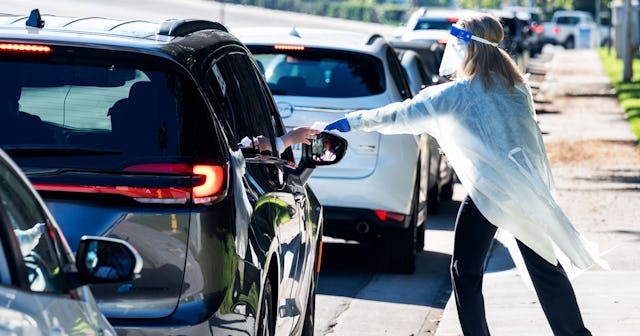COVID Tests Are In Short Supply — Here’s What To Do If You Can’t Find One

With the latest COVID surge due to the highly contagious Omicron variant, people across the United States are all running into the same problem. With the new spike in cases, there are long lines at testing centers, shortages in at-home tests, and all around frustration that the end of this pandemic seems like it’s never coming. The Biden administration announced it would be making 500 million at-home COVID tests available for free to those who requested them this month, but there is currently no information on how to request one. All these circumstances combined have left many to wonder, where is the best place to find a test?
Why Testing is Still Important
With the recent change in isolation time implemented by the CDC, testing is even more important in diagnosing new COVID infections. There are several different types of tests, with some more reliable than others or providing different types of information. Still, testing remains effective in limiting the spread of COVID and reducing potential exposure to others. For these reasons, if you develop symptoms or have been exposed to COVID you should get tested for confirmation.
Where is the Best Place to Find a COVID Test Right Now?
There are a few different places to go that are providing COVID tests. With the current surge, it’s recommended to verify the amount of tests available as well as the testing procedure. Some locations are not taking walk-ins and an appointment is required. It’s also best to verify if testing is provided for free or insurance is required.
Retailers – Retailers such as CVS, Walgreens, Rite Aid, Target and even smaller local pharmacies have been offering free PCR and rapid tests to anyone that falls under the CDC guidelines for free testing. They also offer at-home testing kits for purchase, though with the current surge, supplies are limited.
Sites like Amazon and Everlywell also sell at-home testing kits. Prices for at home kits start at $14 and can go up to $100. If you are purchasing a kit to test at home, you want ensure it is approved by the FDA.
Health Centers – The U.S. Department of Health & Human Services (HHS) has a directory of health centers, which lists clinics that offer COVID screenings. These centers offer both PCR and rapid tests. Lines have been long the past few weeks, so call ahead to see if an appointment is required, and if testing is free or you are required to pay.
Local community buildings – Many municipalities and counties offer free COVID testing at library buildings, fire departments, malls and community centers.
Mobile and pop-up testing – With the recent surge, many cities and states that have been hit hard have implemented more mobile testing sites. Check with your city/states local website for more information on how to locate these events.
Your physician – If all else fails, contact your primary physician. You should, of course, call before heading into the office (especially if you’re experiencing symptoms). It is possible your physician will refer you to one of the above options for testing, but it does not hurt to try.
With little information about when the winter surge will end, it’s important for us to do our due diligence in remaining on top of our health and safety. While our knowledge of some things change, getting tested as a means to detect infection remains the same.
This article was originally published on